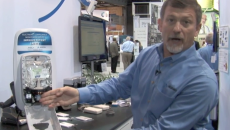Quality and Safety
Many physicians are gung-ho about their smart phones and tablets, but John Halamka, MD, warns there is also a downside, distracting doctors from patient care.
When ONC stands up the NwHIN-Exchange in October, there will be at least 25 partners spanning military, private and public health entities sharing patient records with each other on the back of various standards.
U.S. Surgeon General Regina Benjamin, MD, an advocate for the use of electronic health records, touted preventive care and the benefits of healthcare reform when she spoke in Maine on Monday, the second anniversary of the Affordable Care Act.
It's no longer enough for an infant's pajamas to simply keep the little bundle of joy warm and dry at night. Nowadays, PJs should be able to constantly monitor the baby's vital signs and emotional state, and then relay that information wirelessly to the doting parent's iPad or smartphone.
New York hookers spreading HIV. Killer mosquitos. An anthrax-toting terrorist. An urban-scape rife with the sick and poor. These are just some of the challenges tackled by Farzad Mostashari, a Yale-educated physician, epidemiologist and self-confessed computer nerd. His current mission: moving doctors from the Age of Gutenberg into the 21st century. For starters, he'd like them to use e-mail at the office.
Phil Humbert, Technical Director of Ekahau, teams up with Shawn Worthman, VP of Gojo Industries (makers of Purell sanitizer), to demonstrate their new hand hygiene compliance technology and discuss the importance of the application in professional medical environments.
Todd Park will take over as assistant to the President and U.S. Chief Technology Officer (CTO), filling a vacancy created by last month's departure of Aneesh Chopra, the nation's first CTO.
Sphere3 CEO Kourtney Govro presents Aperum, a dynamic new reporting tool which collects data about each patient's hospital stay and produces reports measuring a hospital's commitment to patient satisfaction.
HL7: not just for IT anymore. That thinking is the catalyst behind a triptych of recent moves designed to open the standards process up to more health professionals, notably caregivers.
For physicians, the proposed rule for meaningful use Stage 2 offers some changes that make it easier for healthcare providers to demonstrate the requirements, including aligning measures with other quality reporting programs.

